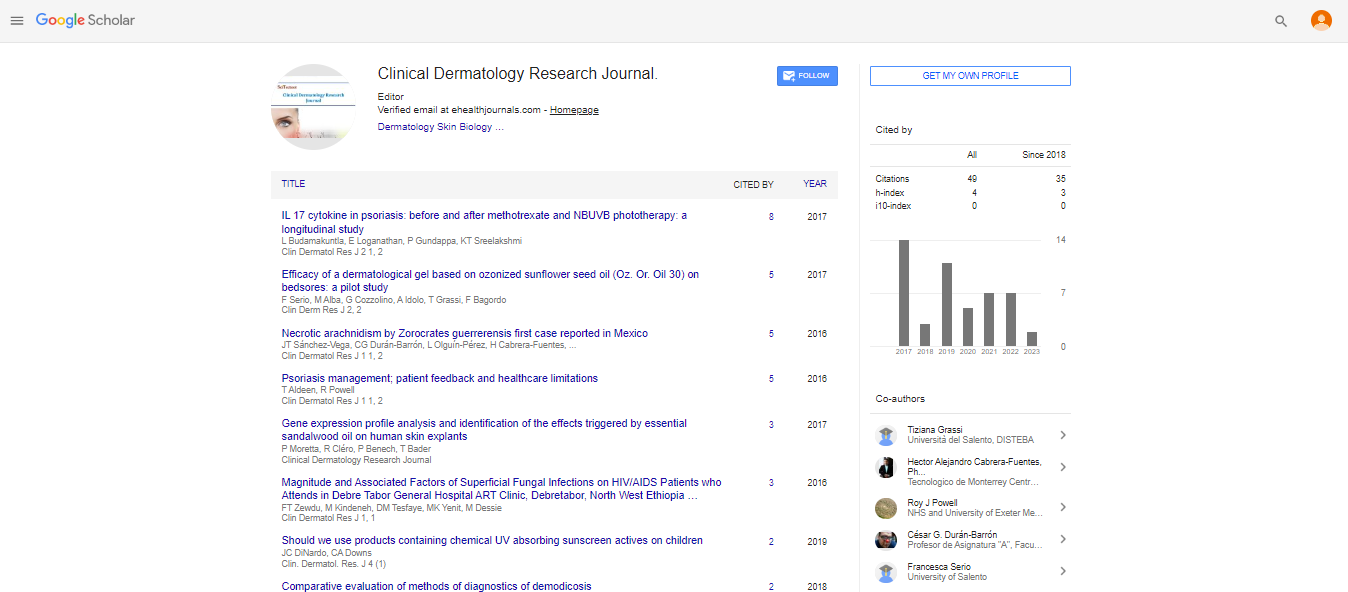Research Article, Clin Dermatol Res J Vol: 1 Issue: 1
Psoriasis Management; Patient Feedback and Healthcare Limitations
| Aldeen T1* and Powell R2 | |
| 1Department of Dermatology, Barnsley Hospital, South Yorkshire, Barnsley, UK | |
| 2Research Design Service South West, University of Exeter, Royal D&E Hospital, Exeter, UK | |
| Corresponding author : Aldeen T Department of Dermatology, Barnsley Hospital, South Yorkshire, Barnsley, UK E-mail: t.aldeen@yahoo.com |
|
| Received: April 23, 2016 Accepted: July 08, 2016 Published: July 14, 2016 | |
| Citation: Aldeen T, Powell R (2016) Psoriasis Management; Patient Feedback and Healthcare Limitations.Clin Dermatol Res J 1:1. |
Abstract
Psoriasis Management; Patient Feedback and Healthcare Limitations
Background: Psoriasis is a lifelong, incurable, disfiguring skin disease. It has been associated with metabolic and psychological comorbidities and up to one third of patients developed psoriatic arthritis. The management of the disease and its comorbidities require careful assessment of the patient’s personal, social, and emotional status. Although, assessment tools have been used to measure psoriasis severity, a patient’s subjective view on the disease is an emotional morbidity that cannot be easily assessed by using such tools. The limited consultation time and resource in a district hospital can prevent psoriasis sufferers from expressing their feelings and challenges with the disease.
Objective: We conducted a postal feedback survey from patients receiving their psoriasis care in a district hospital to assess their physical and emotional morbidities and to capture their views and perception on the healthcare service they received.
Method: A health quality questionnaire was posted to 112 male and female psoriasis patients aged 18 years and above, receiving their care in a district hospital. Patients’ postal address was obtained from the Dermatology Department’s database at the same hospital. The results of the survey were generated by using spread sheet and Stats Direct v3.0.167.
Results: Psoriasis affected the quality of life of 97.8% patients and 71.1% of the patients suffer from comorbidities. Around 44% of the patients developed depression after the onset of the disease and some of them were living without family or social support. Stress was the main triggering factor for psoriasis flare and 55.5% wished to receive more information and counselling on psoriasis by their health provider.
Conclusion: District hospitals may have limited resources to comply with the national recommendations of psoriasis care. Local and regional multi-disciplinary approach is needed for effective management of psoriasis and its comorbidities.
 Spanish
Spanish  Chinese
Chinese  Russian
Russian  German
German  French
French  Japanese
Japanese  Portuguese
Portuguese  Hindi
Hindi 

